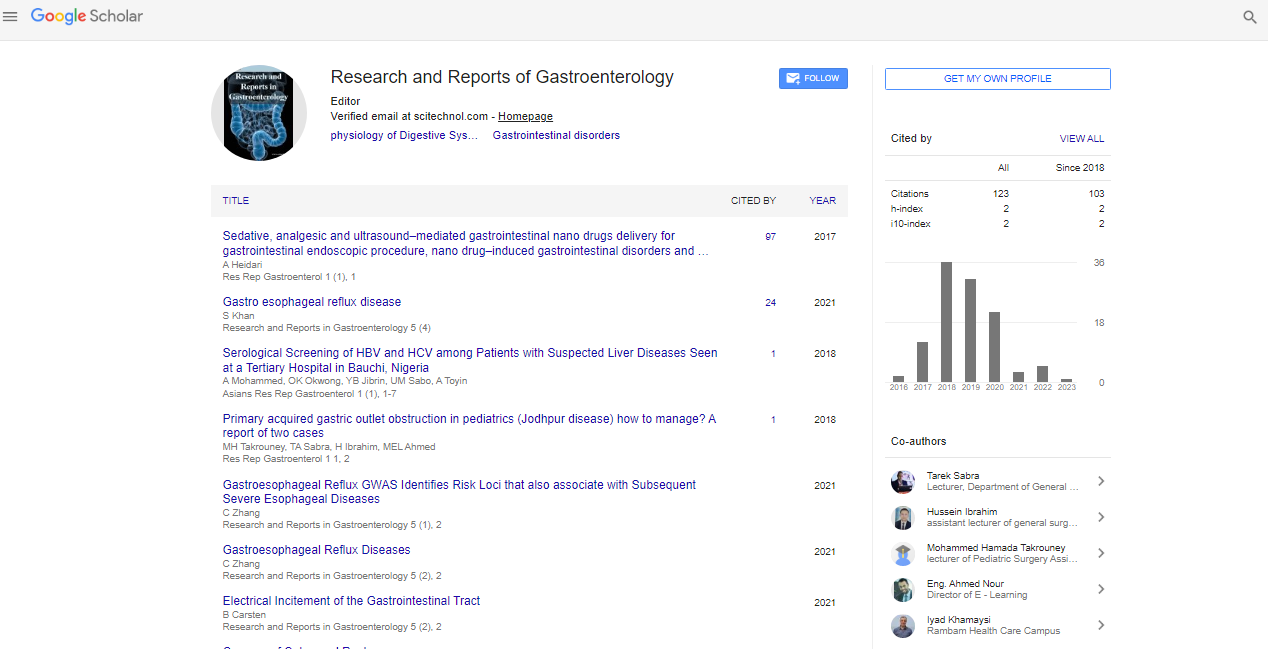Perspective, Res Rep Gastroenterol Vol: 7 Issue: 2
Therapeutic Implications of Gut Microbiota in Gastro Intestinal Disorders
Lilly Cappel*
1Division of Gastroenterology, Indiana University School of Medicine, Indianapolis, USA
*Corresponding Author: Lilly Cappel,
Division of Gastroenterology, Indiana
University School of Medicine, Indianapolis, USA
E-mail: cappellilly@gmail.com
Received date: 15 May, 2023, Manuscript No RRG-23-106615;
Editor assigned date: 17 May, 2023, PreQC No RRG-23-106615(PQ);
Reviewed date: 01 June, 2023, QC No RRG-23-106615;
Revised date: 08 June, 2023, Manuscript No RRG-23-106615 (R);
Published date: 16 June, 2023, DOI: 10.4172/Rrg.1000141
Citation: Cappel L (2023) Therapeutic Implications of Gut Microbiota in Gastro Intestinal Disorders. Res Rep Gastroenterol 2023, 7:2.
Abstract
Description
The gut microbiota a diverse community of microorganisms residing in our gastrointestinal tract plays a crucial role in maintaining overall health. Recent research has highlighted the significant impact of gut microbiota on the development and progression of various gastrointestinal disorders. This comprehensive review aims to explore the complex relationship between gut microbiota and gastrointestinal disorders, shedding light on the potential mechanisms and therapeutic implications.
Gut microbiota composition
The human gut harbors trillions of bacteria, viruses, fungi, and other microorganisms, collectively known as the gut microbiota. The composition of the gut microbiota varies significantly among individuals, influenced by factors such as diet, genetics, lifestyle, and early-life exposures. A healthy gut microbiota is characterized by a diverse community of beneficial bacteria, which help maintain a balanced gut environment and contribute to overall well-being.
Dysbiosis and gastrointestinal disorders
Dysbiosis refers to an imbalance in the gut microbiota composition, typically characterized by a decrease in beneficial bacteria and an increase in potentially harmful microorganisms. Growing evidence suggests that dysbiosis is associated with several gastrointestinal disorders, including Inflammatory Bowel Disease (IBD), Irritable Bowel Syndrome (IBS), colorectal cancer, and Gastro Esophageal Reflux Disease (GERD).
Inflammatory bowel disease
IBD comprising Crohn's disease and ulcerative colitis is a chronic inflammatory disorder of the gastrointestinal tract. Studies have demonstrated alterations in the gut microbiota composition of individuals with IBD. Reduced microbial diversity and an overabundance of pro-inflammatory bacteria have been observed in IBD patients. This dysbiotic state can contribute to intestinal inflammation and exacerbate disease symptoms.
Irritable bowel syndrome
IBS is a functional gastrointestinal disorder characterized by abdominal pain, altered bowel habits, and bloating. Research has revealed alterations in the gut microbiota of individuals with IBS, including decreased levels of beneficial bacteria and increased abundance of potentially pathogenic microorganisms. These changes may influence gut motility, immune responses, and visceral sensitivity, contributing to the development of IBS symptoms.
Colorectal cancer
The gut microbiota has been implicated in the development and progression of colorectal cancer, one of the most common malignancies worldwide. Dysbiosis and an altered microbial community have been observed in colorectal cancer patients. Certain bacteria can produce genotoxic compounds, promote chronic inflammation, and disrupt the intestinal barrier, contributing to the initiation and progression of colorectal cancer.
Gastroesophageal reflux disease
GERD is a chronic condition characterized by the backflow of stomach acid into the esophagus, causing heartburn and regurgitation. Emerging evidence suggests that alterations in the gut microbiota composition can influence the development of GERD. Disruptions in the gut microbiota balance can lead to impaired esophageal motility, increased gastric acid production, and altered integrity of the esophageal mucosa, contributing to GERD symptoms.
Therapeutic implications
The emerging field of microbiota-targeted therapies holds promise for the treatment of gastrointestinal disorders. Strategies such as probiotics, prebiotics, and Fecal Microbiota Transplantation (FMT) aim to restore a healthy gut microbiota and alleviate symptoms associated with dysbiosis. Probiotics are live beneficial bacteria that can confer health benefits when consumed, while prebiotics are dietary fibers that promote the growth of beneficial bacteria. FMT involves transferring fecal matter from a healthy donor into the gut of an individual with a dysbiotic gut microbiota.
Conclusion
The impact of gut microbiota on gastrointestinal disorders is increasingly recognized, highlighting the potential therapeutic implications. Dysbiosis in the gut microbiota composition has been associated with various gastrointestinal disorders, including IBD, IBS, colorectal cancer, and GERD. Understanding the intricate relationship between gut microbiota and these disorders may pave the way for innovative treatments and personalized interventions aimed at restoring a healthy gut microbiota and improving patient outcomes. Further research in this field will undoubtedly enhance our understanding of the gut-brain-axis and its implications for gastrointestinal health.
 Spanish
Spanish  Chinese
Chinese  Russian
Russian  German
German  French
French  Japanese
Japanese  Portuguese
Portuguese  Hindi
Hindi 